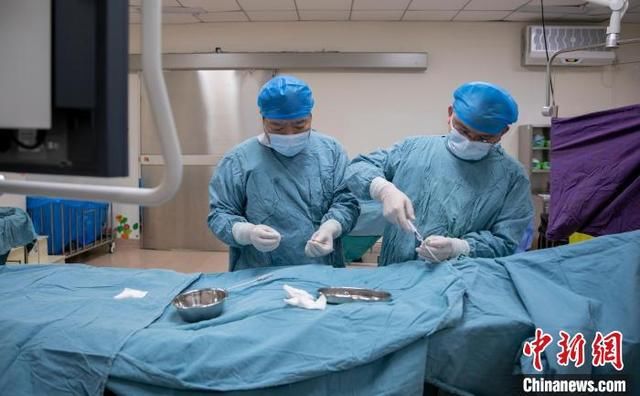This article is from: China News Network

Photo courtesy of Wuhan Children’s Hospital during the operation
Chinanews.com Wuhan China News Service, August 9th (Xue Yuan) Experts from the Department of Cardiovascular Medicine of Wuhan Children’s Hospital recently “sent” an occluder into the heart of a 2-year-old boy Tian Tian (pseudonym) through minimally invasive intervention to close the ventricular septal gap. . The occluder used in this operation is not a traditional metal material, but a more advanced fully degradable occluder. After one year, the occluder will be completely degraded, decomposed into carbon dioxide and water and excreted from the body, and no foreign matter will remain in the body, so that “heart-filling” can be achieved without leaving any traces.
Tian Tian was found to have a small defect in the ventricular septum at the age of 7 months. After more than a year of observation, the defect not only failed to “self-heal”, but also increased. After further improving the examination in Wuhan Children’s Hospital, the doctor suggested minimally invasive interventional blockage treatment. After evaluation by the expert team, it is believed that the use of a fully degradable occluder is suitable for every day.
On the afternoon of August 4th, Zhang Yong, director of the Department of Cardiovascular Medicine of the hospital, led the surgical team for Tiantian surgery. Under the guidance of fluoroscopy and ultrasound, after puncturing the peripheral blood vessels at the root of the thigh every day, the doctor pushed the delivery sheath and occluder to the lesion site of the cardiac developmental defect, and successfully blocked the defect. Postoperative ultrasound showed that the occluder was well formed, with no residual shunt, and the treatment effect was ideal. The day after the operation, I got out of bed and walked every day. On August 8, Tian Tian recovered and was discharged from the hospital.
Zhang Yong introduced that ventricular septal defect is a common congenital heart disease. At present, interventional occlusion is the preferred method for the treatment of ventricular septal defect. The traditional nickel-titanium alloy occluder is widely used in clinical practice and is safe, reliable and effective, but it will remain in the patient’s body permanently. The fully degradable occluder used in this operation is made of biodegradable materials. After being implanted into the human body, the cardiomyocytes “climb” and grow like a creeper. The occluder “completes its mission” begins to degrade gradually, and eventually decomposes into non-toxic small molecules that are excreted from the body.